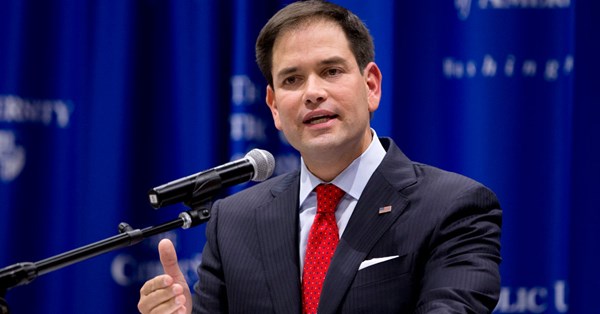Congressman Marco Rubio: Trump does not oppose new sanctions against Russia
US President Donald Trump has nothing against the imposition of new sanctions against Russia; but the State Department, which is trying to establish a dialogue with Moscow, is opposed to this. US Senator Marco Rubio (a Republican from Florida) expressed this opinion on Sunday.
"I personally believe that at the core of resistance [toward sanctions against the Russian Federation] is not the president," he said in an interview with NBC television. "I do not think the president himself has a problem with imposing additional sanctions against Russia. I think the concern actually comes from the State Department, and for the following reason: they argue they are trying to get the Russians to be more cooperative on a number of fronts, and that this [the imposition of sanctions] can set us back," Rubio said.
"It's a legitimate argument; I thought about it, I don't agree with it," the senator said. "And, as you observed this week, the majority of my colleagues also disagree with it," he added, referring to the Senate adoption of a bill on the introduction of new sanctions against the Russian Federation in response to Moscow's alleged interference in the US presidential election.
Speaking about this bill in an interview with CBS, Rubio expressed the hope that, in case of further approval of the document by the House of Representatives, Trump would sign it. "I hope for this," the senator said, answering a pertinent question from the presenter. "It is important to send a signal that it is unacceptable," Rubio said, referring to the alleged influence of the Russian Federation on last year's US elections, in which Washington unsubstantially blames Moscow.
The Upper House of Congress overwhelmingly adopted a bill Thursday on the introduction of new sanctions against the Russian Federation and the legislative consolidation of a number of existing ones. In addition, the senators want to deprive the White House of the right to individually mitigate the sanctions regime. To do this, the President will have to present to Congress a clear list of persons from whom it is planned to lift sanctions, and also to assure lawmakers that the Russian Federation has changed its policy in several areas, including regarding Syria and Ukraine. After reviewing the submitted materials within 30 days, both chambers will have to express their opinion by adopting a resolution.
The bill in question will have to be considered and adopted by the House of Representatives; only after that would it go to President Trump for signature.
